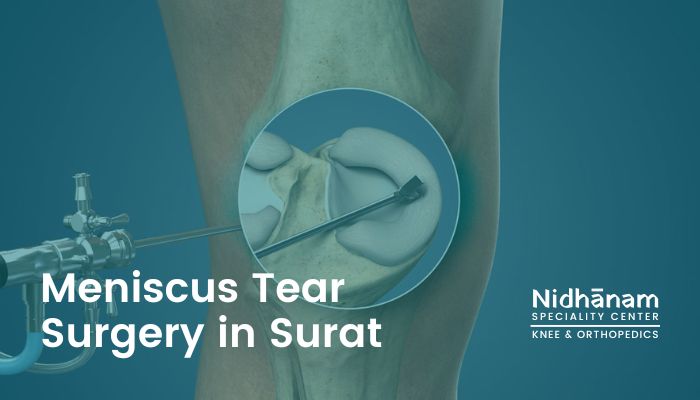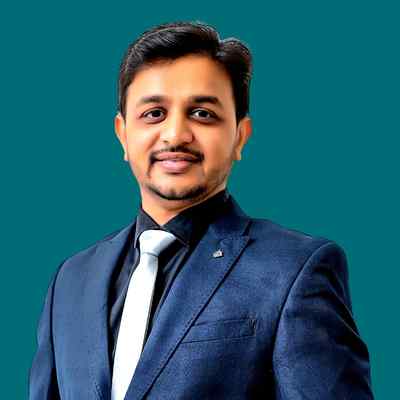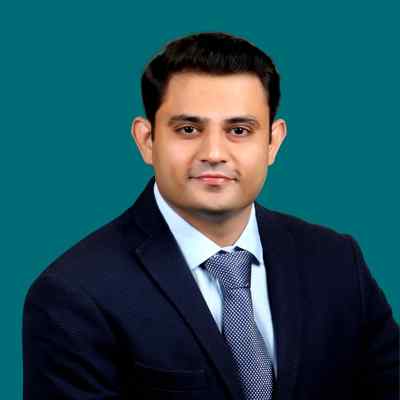Are you struggling with a meniscus tear and seeking expert medical care? Look no further! Nidhanam Speciality Center in Surat is proud to introduce its cutting-edge treatment options for meniscus tear suregry led by the esteemed knee surgeon, Dr. Hiren Jadvani, a pioneer in knee surgery.
A meniscus tear is a common knee injury that involves the tearing of the cartilage discs (menisci) that cushion the knee joint. It can occur due to sudden twisting movements, degenerative changes, or sports-related injuries.
Symptoms of a meniscus tear include pain, swelling, stiffness, popping sensation, and difficulty bending or straightening the knee. A definitive diagnosis is usually made through physical examination and imaging tests like MRI.
When is surgery necessary for a meniscus tear?
Surgery may be necessary when conservative treatments such as rest, ice, physical therapy, and medication fail to relieve symptoms or when the tear is severe and causing significant functional impairment.
Dr. Hiren Jadvani is a highly skilled knee surgeon with extensive experience in treating various knee conditions, including meniscus tears. He is known for his expertise, compassionate care, and commitment to providing the best possible outcomes for his patients. Nidhanam Speciality Center is equipped with state-of-the-art facilities and a dedicated team, ensuring comprehensive and personalized care for every patient.
At Nidhanam, patients can expect individualized treatment plans tailored to their specific needs. The center emphasizes minimally invasive techniques, faster recovery times, and optimal post-operative care to facilitate a smooth recovery and return to daily activities.
Recovery from meniscus tear surgery varies depending on the type and extent of the tear, as well as the chosen surgical technique. Generally, patients undergo physical therapy to regain strength, flexibility, and function in the affected knee. Dr. Jadvani and his team provide comprehensive guidance and support throughout the recovery process.
Meniscus tear surgery treatment at Nidhanam Speciality Center, under the expert care of Dr. Hiren Jadvani, offers patients a path to relief from knee pain and dysfunction. With a focus on advanced techniques and compassionate care, patients can trust in the expertise of Dr. Jadvani and the dedicated team at Nidhanam for optimal outcomes and a smoother recovery journey.
Expert Doctors
Frequently Asked Questions
Arthroscopic surgery is a type of minimally invasive surgery that requires only small incisions thanks to a device known as an arthroscope. It lets your surgeon see inside the joints and view the specific area being worked on during surgery without the need for large incisions.
Arthroplasty is the reconstruction or replacement of a joint such as a shoulder, elbow, wrist, hip, knee or ankle. Depending on the extent of the joint injury or condition, you may need partial or total arthroplasty.
Like human bone, the prosthetic devices used in joint replacement surgery can become damaged or simply wear out. If you’ve previously had partial or total joint replacement surgery but need to have the joint operated on again, it’s considered revision surgery.
Advances in medical technologies — including the prosthetic materials used in total and partial hip, knee, elbow and shoulder joints — continue to extend the life expectancy of artificial joints. Generally speaking, today’s prosthetic devices can last upwards of 15-20 years. Factors that can impact the durability of prosthetics include your activity level, overall health, weight and whether you have arthritis.
While the goal of surgery is to restore function and get you moving without pain, there are usually some limitations after orthopedic surgery. Talk to your orthopedic surgeon about realistic expectations after surgery.
There’s no one-size-fits-all answer for deciding when to have surgery. Your orthopedic surgeon or other doctors will help you determine when surgery is the most appropriate next step. Key considerations include whether you’re in pain, if you’re experiencing instability or decreased mobility, and whether the injury or condition is affecting your quality of life.
For first consult, patient will be evaluated with detailed history and clinical examination before he/she is advised suitable imaging. Additionally, it will be helpful to bring along previous X-rays and scans especially related to fractures and for comparative assessment.
A fracture is a broken bone. A sprain occurs when you injure the ligaments that connect your bones.
For most of the patients, average stay after surgery is between 2-5 days, depending on the type of surgery. Discharge is planned when medical condition is stable, pain is adequately controlled with oral medications, able to eat and urinate and when physical and occupational goals are successfully met. Bracing, rehabilitation and after surgery instructions will be provided to the patient at discharge.
Following discharge after surgery, you are required to contact the physiotherapist who will help in optimum post-operative recovery. At Nidhanam Orthopedics Speciality Center we have consultant physiotherapist and rehab expert in our team of doctors to ensure smooth rehabilitation and recovery.






